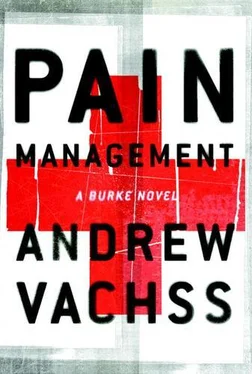The steps had carpeting, but no decorator had picked it out. The door to the office was a joke—I’d loided tougher ones when I was a little kid.
Inside, a drafting table sat in a far corner, its surface cleared, as if awaiting some action. A clever wall unit had been built over lateral file cabinets, the top of which formed a work surface featuring one of those fax-printer-copier combo machines. I hooked a gloved finger into one of the file drawers and pulled experimentally. It came open without resistance. I used a pocket flash to scan the neatly arranged manila folders inside. They were labeled in a draftman’s writing, all apparently names of projects he was working on.
I checked my watch. Still had almost twenty minutes of the forty-five I’d allotted myself for the job. Where the hell was the . . . ? Then I spotted it, lying casually on a small black leather couch: an IBM notebook computer.
I used wooden matches to mark its corners, then picked it up and carried it over to the work surface, reciting to myself the instructions Gem had given me.
First, I made sure the machine had a floppy drive installed . . . yes! . . . and checked access to the parallel port. Then I took fourteen different cables, each individually twist-tied, out of my bag and gently tried each one in turn. Hit paydirt with number six, and connected the notebook to the pocket-sized SCSI drive I was carrying.
I inserted what Gem’s geek had told her was a DOS boot disk into the computer’s floppy drive and powered it up. As soon as its screen showed a progress bar moving slowly to the right, I checked my watch and left the machinery to its own devices.
Kevin didn’t keep his secrets in the usual places. Nothing taped to the underside of drawers, no cutout portions of books, none of the pens were hollow. The carpeting was napless enough to be industrial, but the padding under it was so thick it was spongy to the touch. And the ceiling’s acoustical tile extended halfway down the walls. Maybe it was a look—interior design isn’t one of my specialties.
I expected a DSL connection, or maybe a T1. But he wasn’t even running his online stuff through the TV cable; it was a straight dial-up connect.
And another surprise, there was only one phone line, with no switcher, so he’d have to physically unplug the phone to go online. The phone itself was a high-tech Bang & Olufsen, ultra-audio, directly connected to a large reel-to-reel tape recorder. The setup was pure professional—that recorder could roll for hours and stay as quiet as cancer.
There was no number on the phone. I thought about using it to call my own cellular, then doing a star-69 to capture the info. But the setup spooked me, so I left it alone.
A book was lying open next to the copier. Last Man Standing, Jack Olsen’s monster bestseller. I’d picked it up when it first hit the stores. It was about Geronimo Pratt, an innocent man who had spent a quarter-century in prison, a monument to Hoover’s psychosis of the late sixties, before the courts finally kicked him loose. The book was marked up to the max: pages highlighted in half a dozen different colors, with tiny scribbles in some of the margins. I left it as I found it, open to the same page.
A slight bulge in the carpeting pinpointed the floor safe. It didn’t look like much, but punching or peeling it would have been as subtle as spray-painting the walls. And I didn’t have time to play with the dial; the progress bar on the computer’s screen read “100%.”
I popped out the floppy disk, powered down the machine, removed the cable, and packed up the portable SCSI drive. The notebook went back exactly where I’d taken it from.
One quick scan to make sure I hadn’t left any calling cards, and I was ready to fade, still within my time limit.
Back inside the garage, I started up the Ford. A few seconds’ exposure to carbon monoxide was worth the running start it would give me if I needed it. But when I sent the door up, the driveway was empty.
I was gone in seconds.
Gem wasn’t at the loft when I returned with my swag. I left the computer stuff and the film canister for her; she knew whatto do with them.
The meet with Madison wasn’t for three days. I didn’t want to play my hole card until after I’d spoken with her. I went back into the streets.
I always carry significant currency when I work. It isn’t just for the mordida that’s so much a part of the kind of business I do. A piece of it is emotional—I feel scared without some cash in my pocket. Only born-rich people are comfortable walking around without money.
In New York, it’d take you years of lurking before people noticed you—unless you were crazy enough to hang around a drug drop or a mob storefront. But in Portland, it didn’t take long at all. I didn’t know what the whisper-stream had about me, but I knew I was part of its flow from the way people reacted when I rolled up on them. By then, they all knew I was looking for Rosebud. But they didn’t know why. Unless they bought my story . . . whichever one I’d told them.
I’d put a notice in the personals column of the Willamette Week —an alternative newspaper that was above-ground enough to survive on advertising, mostly from cultural events. If Rosebud saw my ad, she never answered.
There were a few ’zines going around, mostly about the local live-sounds scene. I tracked one of them back to its editor, a nice kid with a color printer and a passionate love of industrial music. He said he’d never heard of Rosebud, didn’t recognize her picture.
He didn’t look like he got out of the house enough to be that smooth a liar, so I figured he was playing it straight. I asked him what it would cost to run a box ad. He told me he didn’t do stuff like that; his “operation” was “noncommercial.” But he did hook me up with another ’zine, this one devoted to what they called thugcore music. “Hardcore’s like bubblegum to us, man,” the kid in charge told me.
He listened as I explained that Rosebud wasn’t tattooed or pierced, hadn’t shaved her head, and didn’t spend a lot of time in mosh pits. But when I told him that she played acoustic guitar, he told me to keep my money.
There’s another music scene that doesn’t get air play—unless you count the shortwave psycho-shows. NSBM—National Socialist Black Metal—a bizarre brew of confused mysticism and real clear race hate. You can’t find it over-the-counter, but it does a big enough business on the Internet that it’s already being ripped off . . . bootlegged, big-time.
From the picture I’d been putting together of Rosebud, I couldn’t see her anywhere near that crap. So I passed on the thugcore kid’s offer to get me some names.
I didn’t like it that the father was so sure she was still in Portland, so I followed him around for a couple of days. He had a lot of meets in semi-public places—walking along the waterfront, having a snack from a street vendor, in a coffeehouse—with people I didn’t recognize. But none of them were within thirty years of the kid’s age. Maybe he’d covered his bets, hired some more personnel.
“That’s Geof Darrow’s work, all right,” Madison said, tapping one long fingernail on the sixteen-by-twenty-inch enlargement. I’d had it made from the photo I’d taken of the drawing in Rosebud’s room. “It’s as distinctive as a fingerprint. There isn’t another artist in the world who could do this . . . although plenty try.”
“Never heard of him,” I said. Which wasn’t quite true. My old prison partner, Hercules, had everything Darrow ever drew.
“God. You didn’t see The Matrix ?”
The way she said the words, like it was something sacred, I knew she was talking about a movie.
Читать дальше











